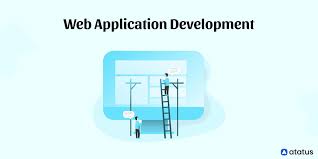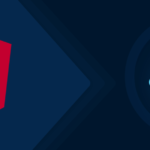Unlike traditional software, web applications do not necessitate downloads; they are accessed conveniently through a web browser, offering numerous advantages. Many businesses recognize the importance of boosting their online presence. To achieve this, developing a web application is a strategic choice.
Notable examples of web applications include Google G-Suite, Amazon, Canva, Spotify, and WhatsApp. Leveraging a custom software development company’s expertise for your web application can yield remarkable benefits. It allows you to streamline business processes, ensure optimal data security, and facilitate scalable growth.
Web Application- A Brief
The process of merging client-side and server-side programming to create an accessible application through a web browser is called web application development.
In the initial stage of the web app development process, the developer looks to solve a particular issue before building the web app using a suitable development framework. Then, the developer examines and publishes the web application.
Let’s take a glance at the types of web apps –
Single Page Web Apps
A single-page application (SPA) is a single page that interacts with the user continuously by adaptively rephrasing the webpage rather than loading completely new pages from a server. Examples of single-page apps include Trello, Facebook, Gmail, and Twitter.
Static Web Apps
An individual visiting a static website receives it exactly as it was saved. This means that unless the website is wholly redesigned or the web developer changes something directly in the code, neither the user nor its site owner can alter anything on the page.
The simplest and most fundamental type of website is a static webpage. It just needs client-side processing, not server-side or back-end processing. The software development company uses client-side technologies such as JavaScript, HTML, and CSS.
Dynamic Web Apps
Dynamic sites are frequently called web apps, and static sites as web pages. Everything comes back to the concept of websites and online applications.
Websites can be web applications; however, not all websites are web applications. Facebook is both a website and a web application, for instance. Web applications, however, are more than just basic websites for businesses.
Portal Web Apps
The benefit of a portal application is that once a user logs in, the service provider can monitor their web behavior. Users can customize the portal to show quick links to interesting websites, connections to email and chat groups, and the ability to alter the backdrop and colors.
Progressive Web Apps
These are cross-platform web applications that use the latest browser APIs and capabilities to offer a similar experience to a native mobile application
Why Contact Custom Software Development Companies Web Apps?
- Web applications streamline workflows, increase efficiency, and enhance productivity. Employees from different departments can work on the same project seamlessly.
- Using web applications saves money on software licenses, maintenance fees, support fees, and data migration costs. Development time is also reduced compared to building software from scratch.
- Web applications provide greater visibility into data and give control over data access and usage.
- Web applications have extensive functionality and can access features of any device. Examples include Uber, Netflix, Google Translate, Tumblr, and Snapchat.
- Customizing web apps maximizes functionality and ensures the security of an online presence.
Top 5 Features To Have In Your Next Web App
Web apps are the right way to streamline business processes while reaching more customers. When considering what features to include in your next web app, you might wonder which ones matter the most.
It’s vital that you keep the goals of what you are trying to achieve in mind when creating your web app, or you can hire any custom software development company as they can help you with your web app development.
Top 5 Features To Include In Web App
Mobile Responsiveness
As more people access the internet through mobile devices, web apps need to be able to load quickly and look good on any screen size or resolution.
Responsive designs ensure that the web app looks great at any size, from desktop monitors down to small phones and tablets. Even two-thirds of the internet is mobile, so why would you build a desktop app? That doesn’t make sense.
Hire app developers while keeping mobile responsiveness in mind from the beginning. It’s important to consider how people will use your web app on their phones and tablets before you even start writing code. Make sure to choose a testing pyramid methodology for identifying any issues/errors before making the web app live.
Add Multiple Languages
Add multiple languages to your web app so users can easily navigate different app sections in their preferred languages. Visitors love spending time on your site if you have multiple languages available.
A Customizable Dashboard
A highly customizable dashboard gives you the ability to track essential data more effectively and make better decisions based on the data that is available to you.
A customizable dashboard lets you personalize your web app for optimal user experience. This means that users will be more likely to stay engaged with your web app and use it for its intended purpose. You can hire a custom software development company, as they specialize in creating highly customizable dashboards.
Live Chat Feature
Nowadays, almost every web app comes with built-in live chat options, allowing you to communicate with other users in real-time, which helps build a community around your app.
Additionally, it’s a beautiful way to foster customer relationships and brand loyalty, both of which can be crucial for small businesses. The live chat function is frequently used for customer assistance.
Push Notifications
Push notifications keep your users updated about your app without them having to leave the page. They’re handy when you have a quick update to send out immediately.
Moreover, push notifications can help you measure user engagement and see which messages are most effective for driving conversions. It’s definitely the most crucial feature you should consider asking for custom software development services to include.
Lets End
The web app resources are stored on a remote web server and served to the user through a web browser. Some examples of web apps are emails, instant messaging services, word processors, photo editing tools, and more.
Apart from the above, you can add many other features to make your web app more beneficial for your customers. These applications provide a great user experience and keep you and your users safe.
Contact the custom software application development company if you want any help.










